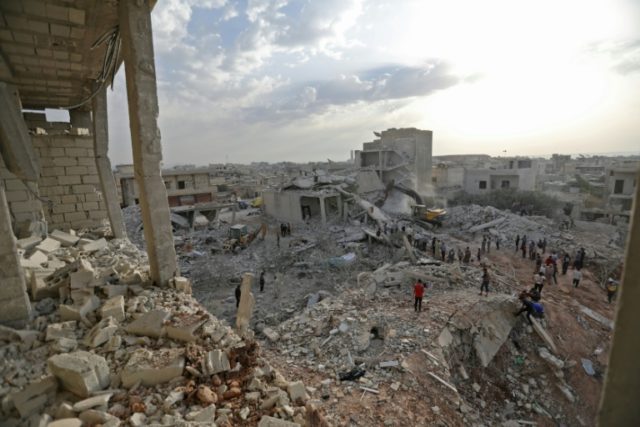Dictator Bashar Assad ramped up his assault against rebel positions in southwestern Syria on Friday, deploying his infamous “barrel bombs” despite warnings from the United States that he is violating a “deconfliction zone,” jeopardizing civilian lives and threatening the security of neighboring Israel.
Barrel bombs are cheap, deadly, and indiscriminate weapons made by packing a container with gasoline and shrapnel. They are typically deployed by simply heaving them out of a helicopter, making them one of the least accurate weapons in any modern arsenal. The barrel bomb relies upon its enormous blast radius and outsized terror impact for its effectiveness.
The United Nations Security Council passed a resolution condemning barrel bombs in 2014, but stronger measures have been blocked by Assad’s patrons in Russia, who bizarrely insisted that demanding a halt to the use of these hideous weapons would jeopardize international peace talks. The Russians also support Assad’s insistence that he has not used barrel bombs, even though there is photographic evidence of Syrian forces dropping them on civilian areas, and observers say thousands – possibly tens of thousands – have been killed by them.
The London-based Syrian Observatory for Human Rights said on Friday that Assad’s forces dropped over a dozen barrel bombs on Busra al-Harir and surrounding towns. Rebel groups fighting under the banner of the Free Syrian Army – long regarded as the premier “white hat” force of good-guy Syrian rebels, although some of them have recently turned in unsavory directions – said three towns were hit with barrel bombs, while a fourth was targeted with conventional airstrikes.
Assad’s assault, which appears designed to cut a major rebel bastion in half so the isolated segment can be more easily destroyed, has not yet featured the heavy Russian airpower that helped him turn the tide of the civil war, but the Russian ambassador to Lebanon gave strong indications in a recent interview with a Hezbollah newspaper that Russian assistance could be coming soon.
“Israel has no justification to carry out any action that obstructs the fight against terrorism,” Ambassador Alexander Zasypkin added, referring to Israel’s concerns about Iran-linked militia forces and actual Iranian troops moving into aggressive positions along the Syrian border. Israel has occasionally expressed those concerns with airstrikes.
Barrel bombs are just about the worst weapons in Assad’s inventory next to chemical weapons, which he has also deployed against civilian targets. The New York Times reported Wednesday that some of the worst details were actually omitted from a report released this week by the U.N. commission investigating possible war crimes in Syria.
Fully seven pages of damning specifics about Assad’s campaign to recapture eastern Ghouta in the first quarter of 2018 were cut from the report and consolidated into a mere two-paragraph summary, ostensibly because the U.N. commissioners wanted more time to verify the accounts – even though the NYT notes “the conclusions in the omitted information seemed unambiguous.”
What those redacted pages unambiguously describe is the Assad regime gassing its own civilians using Iranian-made artillery rockets and dropping chemical bombs that killed dozens of people, including children. The commission went so far as to prepare a list of Syrian officials who could be charged with war crimes.
The United States warned Assad last week that his offensive risks violating the “de-escalation pact” agreed to with the U.S. and Russia, an agreement intended to “save lives and create conditions for the displaced to safely and voluntarily return to their homes,” as State Department spokeswoman Heather Nauert put it.
The stream of thousands of civilians fleeing from the “de-escalation zone” would strongly suggest this objective is not being met. Assad used the “peace process” to reload his weapons and move forces into position for a final victory, with the approval of the very same government in Moscow that claimed protecting civilian lives was its highest priority. Having finished off most of the major military threats to his regime, Assad sees the “de-escalation zones” as shooting galleries, and he knows he will not be held responsible for creating another refugee tidal wave, or required to deal with any of the consequences.
The U.S. has warned it will take “firm and appropriate measures” if the Assad regime and its allies continue to violate the de-escalation zones. Assad claims he is “liberating” the areas under attack from “terrorists” by force after negotiations failed.
“The United States remains deeply troubled by reports of increasing Syrian regime operations in southwest Syria within the boundaries of the de-escalation zone negotiated between the United States, Jordan, and the Russian Federation last year and reaffirmed between Presidents Trump and Putin in Da Nang, Vietnam in November. Syrian regime military and militia units, according to our reports, have violated the southwest de-escalation zone and initiated airstrikes, artillery, and rocket attacks,” Nauert stated on Thursday for the U.S. State Department.
“The United States continues to warn both the Russian government and the Assad regime of the serious repercussions of these violations and demands that Russia restrain pro-regime forces from further actions within the southwest de-escalation zone,” she said.

COMMENTS
Please let us know if you're having issues with commenting.